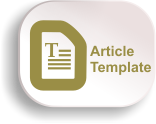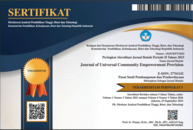Improving the Quality of Education Through Literacy and Numeracy Learning, Technology Adaptation Assistance and Administration
DOI:
https://doi.org/10.55885/jucep.v3i1.257Keywords:
Teaching, Campus Merdeka, Student CompetenciesAbstract
The article discusses the Teaching Campus program that is part of the Merdeka Learning Kampus Merdeka (MBKM) policy implemented by the Ministry of Education and Culture in Indonesia. The program aims to enrich student competence by providing opportunities for students to learn outside the classroom by providing assistance to teachers and education staff at the education level, especially through increasing literacy, numeracy, adapting technology and assisting with administration. The article also highlights the Independent Learning Policy - Independent Campus, which is an autonomous and flexible form of learning in tertiary institutions that creates a learning culture that is innovative, not restrictive, and in accordance with the needs of students. The main programs are facilitating the opening of new study programs, changes to the higher education accreditation system, facilitating public universities to become PTNs with legal entities, and the right to study three semesters outside the study program. The article details the objectives of the Teaching Campus program, including fostering an attitude of empathy and awareness in students in dealing with problems in the surrounding environment, exploring the creative mindset together in various fields, and promoting and supporting national development. The article also highlights the preparation, implementation, and analysis of the results of the Teaching Campus program, which includes debriefing activities, coordination with the district/city education office, coordination with the target elementary school, and the implementation of the program. The Teaching Campus program is expected to provide opportunities for students to enrich themselves through activities and ideas outside of learning activities and provide scholarship opportunities for smart students by using their creativity and encouraging special education in 3T places so that they are the same as schools that have quality education according to national standards.
References
Ahmad, N., & Ahmad, R. (2019). Technology-enhanced learning in higher education: A bibliometric analysis. International Journal of Emerging Technologies in Learning (iJET), 14(03), 128-145. https://doi.org/10.3991/ijet.v14i03.9533.
Anggraeni, D., Jundika, C., & Syahbana, A. (2020). Implementing mobile learning as a new learning model in education. International Journal of Emerging Technologies in Learning (iJET), 15(08), 183-191. https://doi.org/10.3991/ijet.v15i08.12005.
Bera, R., & Mohapatra, A. (2018). Role of technology in education: A study on teacher's perception of ICT integration in Indian higher education. Journal of Education and Practice, 9(1), 1-10. https://doi.org/10.7176/jep/9-1-01.
Farooq, R., & Amin, M. (2020). Impact of technology on teaching and learning process: A review of literature. Journal of Education and Practice, 11(20), 1-8. https://doi.org/10.7176/jep/11-20-01.
Ismail, H., & Rosman, A. J. (2017). Mobile learning in higher education: A meta-analysis. International Journal of Emerging Technologies in Learning (iJET), 12(05), 15-24. https://doi.org/10.3991/ijet.v12i05.6902.
Kozlov, S. S., & Medvedeva, O. A. (2019). The influence of teacher's competence on the development of students' information and communication competences in modern conditions. International Journal of Emerging Technologies in Learning (iJET), 14(08), 117-128. https://doi.org/10.3991/ijet.v14i08.9673.
Lin, T. J., & Lan, Y. J. (2019). Enhancing the English listening comprehension of EFL learners using a mobile game-based learning system. Educational Technology Research and Development, 67(und of mobile internet. International Journal of Emerging Technologies in 5), 1135-1151. doi: 10.1007/s11423-019-09673-4.
Liu, S., Wang, L., & Dong, Z. (2020). Constructivism-based interactive classroom in college English teaching under the backgro Learning (iJET), 15(09), 51-62. https://doi.org/10.3991/ijet.v15i09.12032.
Miah, S. J., Hasan, M. A., & Gammack, J. (2019). Social media adoption in higher education: A theoretical review and research agenda. International Journal of Emerging Technologies in Learning (iJET), 14(06), 4-19. https://doi.org/10.3991/ijet.v14i06.9228.
Morsink, P., & Staring, R. (2019). Peer feedback in computer-supported collaborative learning environments: A systematic review. Educational Research Review, 27, 160-181. doi: 10.1016/j.edurev.2019.01.004.
Nurfadilah, N., Hidayanto, A. N., & Fauzi, M. F. (2020). The use of learning management system to support distance learning in higher education during the covid-19 pandemic. International Journal of Emerging Technologies in Learning (iJET), 15(11), 212-223. https://doi.org/10.3991/ijet.v15i11.12577.
Rani, P., & Kumar, M. K. (2019). Impact of teacher-led innovative teaching strategies on students’ academic achievement in science at the secondary level. Journal of Education and Practice, 10(14), 68-76.
Wibowo, A., Haryanto, E., & Suharno, S. (2019). Collaborative multimedia learning and digital citizenship in higher education. Journal of Educational Technology and Society, 22(4), 193-205. doi: 10.14742/ajet.5636.
Downloads
Published
How to Cite
Issue
Section
License
Copyright (c) 2023 Journal of Universal Community Empowerment Provision

This work is licensed under a Creative Commons Attribution-ShareAlike 4.0 International License.
















